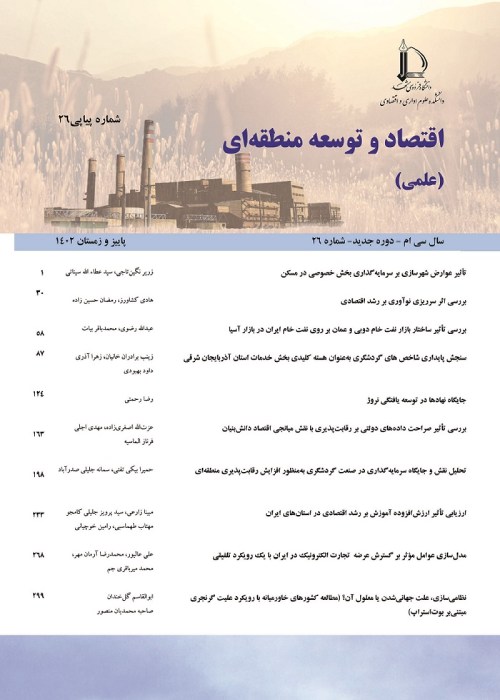The Effect of Governance on Carbon Dioxide Expansion in the G8 Countries: A Panel Quantile Regression Approach
Good governance is an index designed by the World Bank to classify governments in terms of their attention to people and their social and economic status. One of the most important factors in implementing good governance in many countries has been environmental decision making, in today's world, the environment is one of the most important issues facing people. Various factors affecting the environment include economic variables (industrialization, trade and technological inequality), political variables (democracy and despotism), social variables (urbanization and literacy rate) and government (size and quality of government). In this study, the effect of good governance on CO2 emissions in G8 countries is investigated.
Theoretical framework:
Governance has a broad meaning that is directly related to domains such as the economic environment or, in other words, economic security, politics, society and rights. The World Bank has introduced governance indicators to reflect the institutional quality of countries. These indicators include voice and accountability, political stability, control of corruption, regulatory burden, government effectiveness and rule of law. Various aspects of governance, both direct and indirect, affect carbon dioxide emissions.
Quantile regressions id based on a symmetric and asymmetric loss function and calculated similarly to the estimation of parameters in the Ordinary Least Squares (OLS) regression. The general definition of quantile regression is that if the linear regression model is assumed to be the followingEquation (2), the condition quantile function τ distribution of y shows to the condition of random variables x, where the following condition holds.) =To estimate the coefficients of the model, minimize the value of the absolute value of the errors is used with proper weighing: Equation (3) obtains answers by linear programming. In this study, a panel quantile regression method with fixed effects is used. Consider the following fixed-effect panel quantile regression model: Where is the conditional 100 quantile of , is the fixed-effects parameters correlated with , which exhibits the unobservable effects of each specific country and is the slope coefficient at the 100 quantile. The unique feature of this method is that a penalty term in minimizing to address the computing problem introduces a sum of parameters; Estimates of the parameters are as follows:min(α,β) (5)In relation (5), i indicates the number of countries (N), T time period, K, the level of quantiles, x the matrix of explanatory variables and the quantile loss function. In addition, shows the relative weight for kth quantile. In this paper, = 1/K is considered. λ is the adjustment parameter that reduces the individual effects of to zero to improve the performance of β.
The model presented in this study is as follows:The description of variables is as follows: The estimation results in Table (2) show that energy consumption at all quantile levels from 5% to 95% has a positive and significant effect. As shown in Figure (1), the effect of energy consumption on CO2 emissions in all countries has a constant trend. GDP has a negative effect on CO2 emissions at all quantile levels, the results of the OLS estimates also confirm the negative relationship between GDP and carbon dioxide emissions. The results of different quantile levels show a strong and positive effect on the relationship between governance and CO2 expansion.Trade openness in the quantile of 5% to 20% has a positive and significant effect on carbon dioxide emissions, but for the quantile levels above 70%, the increase in trade has a negative impact on CO2 emissions. The relationship between urbanization and carbon dioxide emissions is positive and significant at all quantile levels. The relationship between industrialization and carbon dioxide expansion is also positive and significant at all quantile levels.Chart (1)-Estimation results of panel quantile regression
Conclusions & Suggestions:
This study investigates the effect of governance on carbon dioxide emissions in the G8 countries over the period 1996 to 2016 using the panel quantile regression method. The results show that the effect of the good governance index, which shows the quality of a country's public institutions and the ability of the government to perform its duties, has a negative and significant effect on the amount of carbon dioxide emissions that represent environmental status in all quantiles. However, this effect is stronger in the lower quantiles and reduces the movement to the higher quantiles.
- حق عضویت دریافتی صرف حمایت از نشریات عضو و نگهداری، تکمیل و توسعه مگیران میشود.
- پرداخت حق اشتراک و دانلود مقالات اجازه بازنشر آن در سایر رسانههای چاپی و دیجیتال را به کاربر نمیدهد.



